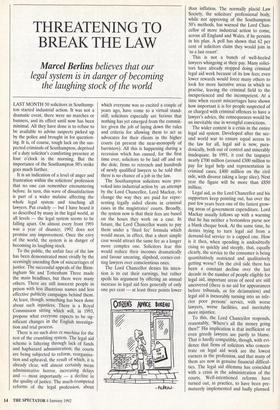THREATENING TO BREAK THE LAW
Marcel Berlins believes that our
legal system is in danger of becoming the laughing stock of the world
LAST MONTH 50 solicitors in Southamp- ton started industrial action. It was not a dramatic event, there were no marches or banners, and its effect until now has been minimal. All they have done is to refuse to be available to advise suspects picked up by the police and brought in for question- ing. It is, of course, tough luck on the sus- pected criminals of Southampton, deprived of a duty solicitor's comforting presence at four o'clock in the morning. But the importance of the Southampton 50's strike goes much further.
It is an indication of a level of anger and frustration within the solicitors' profession that no one can remember encountering before. In turn, this wave of dissatisfaction is part of a wider malaise affecting the whole legal system and touching all lawyers. Put crudely — but I have heard it so described by many in the legal world, at all levels — the legal system seems to be falling apart. On almost every front 1991 was a year of disaster; 1992 does not promise any improvement. Once the envy of the world, the system is in danger of becoming its laughing stock.
To the public, the unfair face of the law has been demonstrated most vividly by the seemingly unending flow of miscarriages of justice. The successful appeals of the Birm- ingham Six and Tottenham Three made the main headlines, but there were many others. There are still innocent people in prison with less illustrious names and less effective publicity campaigns behind them. At least, though, something has been done about such injustices. There is a Royal Commission sitting which will, in 1993, propose what everyone expects to be sig- nificant changes in the English investiga- tion and trial process.
There is no such deus ex machina for the rest of the crumbling system. The legal aid scheme is faltering through lack of funds and haphazard administration; the courts are being subjected to reform, reorganisa- tion and upheaval, the result of which, it is already clear, will almost certainly mean administrative horror, increasing delays and — most importantly — a decline in the quality of justice. The much-trumpeted reforms of the legal profession, about
which everyone was so excited a couple of years ago, have come to a virtual stand- still; solicitors especially are furious that nothing has yet emerged from the commit- tee given the job of laying down the rules and criteria for allowing them to act as advocates for their clients in the higher courts (at present the near-monopoly of barristers). All this is happening during a recession which has caused, for the first time ever, solicitors to be laid off and on the dole, firms to retrench and hundreds of newly qualified lawyers to be told that there is no chance of a job in the law.
The Southampton solicitors were pro- voked into industrial action by an attempt by the Lord Chancellor, Lord Mackay, to change the way they are paid for repre- senting legally aided clients in criminal cases in the magistrates' courts. Broadly, the system now is that their fees are based on the hours they work on a case. In future, the Lord Chancellor wants to pay them under a 'fixed fee' formula which would mean, in effect, that a short simple case would attract the same fee as a longer more complex one. Solicitors fear this would reduce their incomes dramatically and favour uncaring, slipshod, corner-cut- ting lawyers over conscientious ones.
The Lord Chancellor denies his inten- tion is to cut their earnings, but rather spoils his argument by offering an annual increase in legal aid fees generally of only one per cent — at least three points lower than inflation. The normally placid Law Society, the solicitors' professional body, while not approving of the Southampton 50's methods, has warned the Lord Chan- cellor of more industrial action to come, across all England and Wales, if he persists in his plan. A poll has shown that 62 per cent of solicitors claim they would join in `as a last resort'.
This is not a bunch of well-heeled lawyers whingeing at their pay. Many solici- tors have already stopped doing criminal legal aid work because of its low fees; even lower rewards would force many others to look for more lucrative areas in which to practise, leaving the criminal field to the inexperienced and the incompetent. At a time when recent miscarriages have shown how important it is for people suspected of or charged with criminal offences to have a lawyer's advice, the consequences would be an inevitable rise in wrongful convictions.
The wider context is a crisis in the entire legal aid system. Developed after the sec- ond world war to ensure equal access to the law for all, legal aid is now, para- doxically, both out of control and miserably inadequate. In 1991, it cost the taxpayer nearly £700 million (around £300 million to pay for legal help and representation in criminal cases, £400 million on the civil side, with divorce taking a large slice). Next year the figure will be more than £850 million.
Legal aid, as the Lord Chancellor and his supporters keep pointing out, has over the past few years been one of the fastest grow- ing areas of government expenditure. Lord Mackay usually follows up with a warning that he has neither a bottomless purse nor a blank cheque book. At the same time, he denies trying to turn legal aid from a demand-led service to a capped one. How is it then, when spending is undoubtedly rising so quickly and steeply, that, equally clearly, the service to the consumer is being quantitatively restricted and qualitatively getting worse? On the civil side there has been a constant decline over the last decade in the number of people eligible for legal aid, important areas of need are still uncovered (there is no aid for appearances before tribunals, or for defamation) and legal aid is inexorably turning into an infe- rior poor persons' service, with worse lawyers, worse facilities, and inevitably more injustice.
To this, the Lord Chancellor responds, reasonably, 'Where's all the money going then?' His implication is that inefficient or even greedy lawyers are partly to blame. That is hardly compatible, though, with evi- dence that firms of solicitors who concen- trate on legal aid work are the lowest earners in the profession, and that many of them are now in genuine financial difficul- ties. The legal aid dilemma has coincided with a crisis in the administration of the courts. Well-intentioned reforms have turned out, in practice, to have been pre- maturely implemented and badly planned. It was a good idea to take pressure off the High Court and its judges by increasing the jurisdiction of the lower-level county courts. These can now take some cases of unlimited jurisdiction, most civil claims worth up to £50,000, instead of £5,000. But reports from many parts of the country suggest that the courts have been unable to handle the new influx. 'We're under- funded, understaffed and undertrained,' one court official explained. 'We're expec- ted to take on a huge new workload with a tiny increase of people and resources.'
Such difficulties have been compounded by a failure in the obscure but essential process of 'listing' cases for trial — draw- ing up the timetable for cases to be heard by the judges. In both the civil and crimi- nal courts lawyers — both barristers and
solicitors — are wasting hours, sometimes days, waiting to make their (sometimes
short) appearances. In some courts, for instance, 60 or 100 cases will be set down for 10.30 in the morning, which means that all the parties have to be there at that time. Many of the cases will not be heard until the afternoon, or even not reached at all that day. Yet staggering the timetable seems beyond court officials. On the sur- face this is a trivial point of administrative procedure, but one that infuriates lawyers and, incidentally, drives up legal costs. Lawyers in waiting still have to be paid.
The picture in almost all courts, at all levels, all over England and Wales, is simi- lar: more cases coming to court, efficiency and ability to cope declining, delays increasing, quality of justice suffering. The Home Office, anxious not to be left out in contributing to the growing chaos, has now devised an extraordinary scheme for the future funding of the magistrates' courts, likely to debase the quality of justice even further. It is based blatantly on turnover and productivity, treating the process of justice 'like canned peas', as last year's chairman of the Bar, Anthony Scrivener QC, remarked.
More than 95 per cent of criminal prose- cutions in England and Wales — some two million — start and end at the magistrates' courts. The new formula awards points for particular offences: motoring offences are awarded two points, theft five points, and so on. Then (I am over-simplifying, but not by much) the points are added up at the end of the financial year and the following year's money is based on the score. To treat the dispensing of justice in that way is absurd enough, but the details of the scheme make it positively barmy. It will not matter whether or not the defendant pleads guilty and is sentenced in ten minutes, or fights the case for two days. The point-count is the same. So a court that gets a lot of drunks, who are usually processed very quickly, will accu- mulate scores of points in a day; one which spends the day hearing witnesses in a sin- gle theft trial will be limited to just five points. The ideal will be a succession of guilty pleas by shoplifters, at five points a go; the nightmare, a court in an area in which the police take a lenient view and caution their petty criminals instead of prosecuting them. Under the new system, some courts will, quite literally, go out of business because they've had the bad luck to attract not enough quickie defendants and too many who have the temerity to plead not guilty. At least that reform cannot be blamed on Lord Mackay. The Lord Chan- cellor is responsible for appointing magis- trates, but, anomalously, the Home Office has been in charge of the courts and their management. That is to change, on 1 April, when the Lord Chancellor takes over that responsibility too; but it has been made clear that the Home Office funding plans are to go ahead.
Lord Mackay has been the target for most of the criticism about the disintegrat- ing system. His personal popularity remains high, but his initial reputation as the great reformer brought in, as a Scot- tish outsider, to sort out the English lawyers, judges and courts has long evapo- rated. He is seen now by both solicitors and barristers, a little unfairly, as someone who has failed to fight the legal corner in Cabinet with enough strength and imagi- nation. In particular, he is accused of supine acceptance of Treasury orders on spending.
He should not bear too much of the blame. The fact is that we have a legal sys- tem devised for a quite different, much lower, level of legal activity. No one, 20 years ago, expected the crime rate to grow as fast as it has; no one foresaw quite how large a part the law would play in our affairs. The system is quite unprepared for the Nineties; which is why 1992 will be no better than 1991.











































 Previous page
Previous page